The COVID-19 pandemic continues to cause serious increases in both legal and illegal deforestation, poaching and wildlife crime across Indonesia, and we’re continuing to provide key support for wildlife and habitat protection, conflict mitigation and anti-poaching patrols.
In better news, the rescue and rehabilitation centres we fund have now implemented strict health protocols with staff including COVID-19 antigen testing, which has enabled orangutans to get back to Jungle School.
We remain focused on protecting orangutans, safeguarding habitat and securing the survival of orangutans in the wild and we thank you as always, for being a critically important part of the following key activities.
Over the years, many orangutans have been illegally smuggled into Thailand from Indonesia. The Indonesian and Thai governments have come to an agreement to repatriate stolen orangutans and offspring that have been born in Thailand, back to Indonesia. This has created the need for a new rescue and quarantine centre in North Sumatra to accommodate Critically Endangered Sumatran orangutans once they’re returned to Indonesia.
The Orangutan Project (TOP), Centre for Orangutan Protection (COP) and Orangutan Information Centre (OIC) have formed the Sumatran Rescue Alliance (SRA) and construction has commenced on our new SRA rescue centre. The veterinary clinic, quarantine cages and waste management facilities have been completed. The next items to be built include a warehouse/food storage, office facilities, guard tower and a large, forested enclosure.
It is hoped that many of the repatriated orangutans will be able to be rehabilitated and returned to the wild to help secure the genetic viability of their species. However, some will most likely have to remain permanently at the rescue centre due to physical injuries and disabilities or if they cannot adapt successfully to life in the wild. For orangutans requiring long-term or permanent care, the forested enclosures will provide the opportunity to live the most natural life they can.
This rescue centre will also allow for the temporary housing of injured or compromised wild Sumatran orangutans that are able to be returned to the wild at a later time. They’ll be given medical care, nutritious food and be under close observation. Release of these wild orangutans will occur as soon as they are deemed fit to return to the forest.
Quarantine cages (below left) and overnight cages (below right)
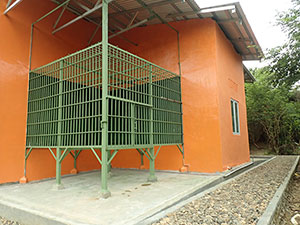
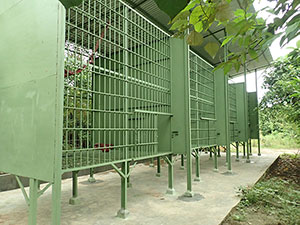
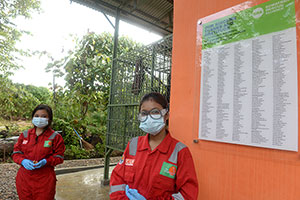
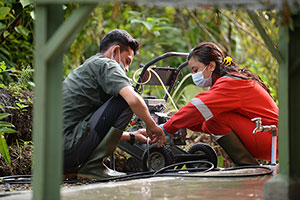
SRA staff with our donor thank you plaque (above left) and undertaking cleaning duties (above right)
We received two female juvenile orangutans named Natalee and Ung Aing from Khao Prathubchang Wildlife Rescue Center in Thailand in December. Both are now undergoing quarantine at our headquarters in Jambi, Sumatra until all medical check-ups are finalised. They’ll then travel to the Bukit Tigapuluh (BTP) Ecosystem to join our Jungle School program. This area is closely patrolled by our Wildlife Protection Units. Natalee and Ung Aing are settling in well after their journey and have good appetites. It is wonderful they have each other for company and support during this time. It is a monumental achievement that orangutans are being repatriated from overseas so they can have the opportunity to live in their native rainforest homes in Indonesia.

Natalee and Ung Aing receiving a vitamin supplement in quarantine
We’ve supported the Human-Orangutan Conflict (HOC) Patrol Teams run by International Animal Rescue in West Kalimantan for many years. Conflict is a serious threat to the survival of orangutans in the wild and the security and sustainability of community livelihoods. Some of the drivers behind the escalation of HOC include human population growth, change in land use, habitat loss and fragmentation, and weak governance of and increasing demand for natural resources. Therefore, the work of these patrol teams has been crucial to reduce HOC and safeguard orangutan populations in the wild, while community development and educational programmes aim to tackle the drivers of orangutan hunting and capture.
Over the past few months, IAR has resumed most of their field activities while following all preventive measures to contain the spread of the COVID-19. The education team has worked intensively to raise awareness in the local communities on the high risks that zoonosis poses to public health and how this is related to the degradation of the environment and wildlife hunting. Allying conservation and public health efforts are of paramount importance to encourage behavioural change of the public and mainly marginalized, forest- edge communities around Indonesia.
A young orangutan, named Kukur by his owner, was rescued in December 2020. He was being kept in a hut and lived together with the family and their other domesticated animals such as dogs, pigs, and chickens. The man claimed to have found Kukur in the forest while he was farming. He said he felt sorry for the orangutan and so brought him home and kept him as a pet. He kept him tied up by a rope around his neck and fed him rice, fruit and other human food including instant noodles and coffee.
On examination, the medical team found old wounds on Kukur’s neck and ankles. The vet estimated the orangutan to be five years old. The team transported him to the rescue centre in Sungai Awan in Ketapang District. Kukur is currently undergoing an eight-week quarantine period to ensure he’s not harbouring any diseases that could be transmitted to other orangutans at the centre.
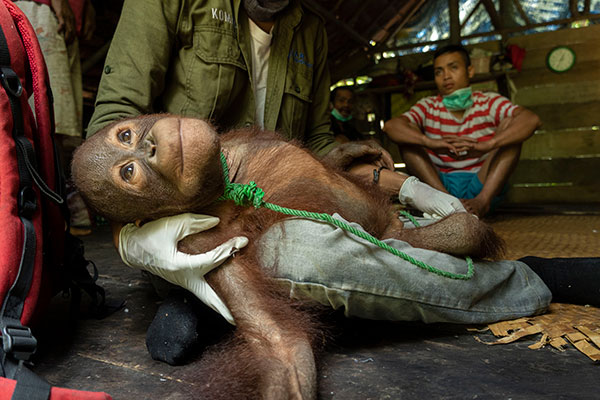
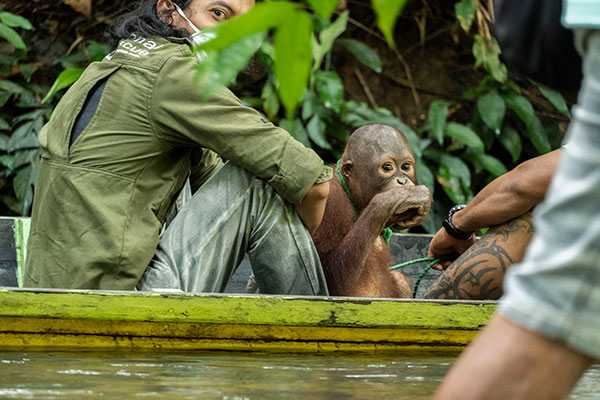
Young orangutan Kukur during his rescue
The goal of forest restoration activities is to restore degraded areas of the Gunung Leuser National Park by replanting indigenous tree species. As a whole process, restoration activities include seedling production, seedling maintenance, weeding, composting, tree planting, tree maintenance, tree height monitoring, and working with local communities to build local stakeholders’ capacity to become stewards of the replanting programme. To build strong engagement of the local communities in the respective restoration sites, our partners at Orangutan Information Centre (OIC) are applying a community participative method which allows the community to be actively involved in restoration activities and gain incomes from working in the restoration program.
Seedling production is the activity which will determine the success of a restoration project. In the process of seedling production, the types of seeds to be planted will be determined within the restoration location. Seedlings produced in the Bukit Mas and Singkil areas originate from primary forest in Gunung Leuser National Park and Singkil Swamp Wildlife Reserve. They are fast growing, fire resistant, flood resistant, and favoured by birds and other animals.
Acknowledging the lack of women involvement in conservation, OIC initiated an intervention which is targeting women living surrounding the Bukit Mas, and Singkil restoration sites. The idea is to engage women in restoring degraded forest in the conservation forest while conducting income generating activities by producing eco-poly bags made of banana trunk fibre. A women’s restoration group has been established in each restoration site, consisting of 25 to 30 women in each group. Before commencing their restoration activities, these groups attend training sessions about seedling production and maintenance, planting and the eco-poly bags made of banana tree trunk fibre. In July 2020, the women's group in Singkil produced 15,000 seedlings that consist of 10 species.
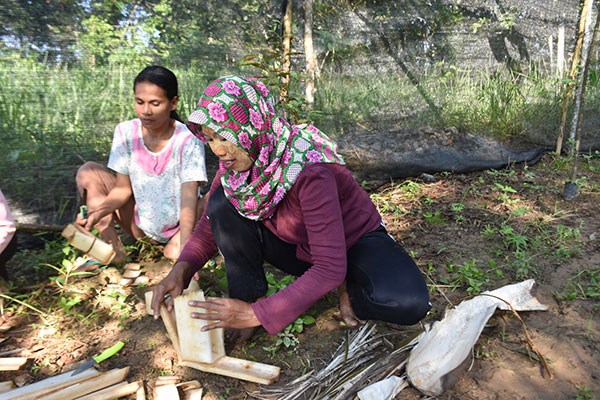
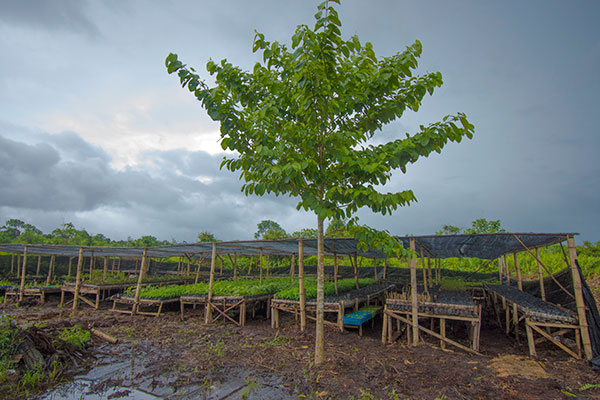
Women preparing the banana stem for seedlings (left) and seedling nursery (right)
Thank you again for helping to make this vital work happen for Critically Endangered orangutans.
If you would like to make a donation to support the above activities please click here - and thank you again, we couldn’t achieve this without you.
|